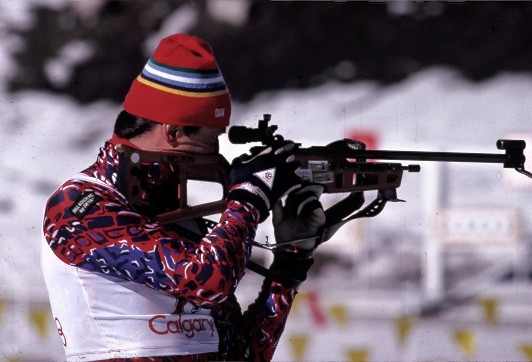By Lyle Nelson
Lucky for me, my Olympic sport, biathlon, required an exceptional level of mental control and composure. Imagine cross-county skiing at maximum exertion, coming into a boisterous stadium filled with cheering, flag-waving spectators and a blaring PA system, and then hyper focusing on shooting at 2-inch targets 50 meters away.
As biathletes we spent endless hours learning to calm our minds and direct our attention to what mattered most in that moment—hitting the target. Everything else was a distraction.
Now decades later, like many people, I am trying to relearn how to find composure and focus during these over-stimulated, chaotic times. I’d like to share several ideas retrieved from the sports world that help us find composure, purpose and joy in our daily lives.
Of the many things on your to-do list, what rises to the top and has great personal significance to you? Maybe it is being the best parent you can be. That is lofty, life-changing for self and others, and harder and more meaningful than making an Olympic team. Maybe your aspiration is protecting the environment. Maybe it’s serving the community through a nonprofit. Maybe it’s being a valued friend. Pursuing such purposes, whether on a small or grand scale, leads to an inspired life and well-deserved self-esteem. Know what matters most to you.
I once said to a fellow biathlon teammate, “John, I always miss my fifth shot.” He replied, “If that is what you say to yourself, you always will.” Negative self-talk (and positive self-talk) tends to be foretelling. Negative self-talk is seldom accurate or helpful. The moment you realize you are beginning a self-belittling thought—stop. Flip the coin and affirm what you are going to do to fix the issue. That’s hitting the target and moving forward. Focus on what you want to have happen.
What feelings do you want to experience tomorrow? I imagine the words joy, kindness, love, gratitude and connectedness are high on your list. When we repeat such life-enriching words to ourselves, we see more opportunities to notice and absorb them. Try it—pick three words and say them repeatedly to yourself for a week. What we think about most tends to manifest.
It astounds me to learn that an essential athletic skill has profound effects on our mental and physical health. Athletes learn to eliminate any unnecessary muscular tension as they perform. New research confirms that muscular tension—tight jaw muscles, tense shoulders, clinched hands—elicit the fight-or-flight stress response. This unconscious tension triggers a cascade of stress hormones which contribute to systemic inflammation and its host of associated chronic conditions. Search your body for unnecessary tension, take a deep breath, blow out the tension and smile.
Yes, focusing on what’s most important in our lives, reducing negative thoughts, and using positive reminders, improves mental health. However, at times, this is not enough and we, or someone we know, become mired in a mental health bog. Do what athletes do: ask a coach, friend, expert for help. We all need it at times.
If you live in Valley County, one of the most powerful and proven mental health boosters exists at your doorstep: a walk in the magnificence of nature.
Lyle Nelson is a former Community Health Administrator for St. Luke’s Health System, a current board member of the St. Luke’s McCall Community Board, Youth Advocacy Coalition, McCall Ski Heritage Foundation, and a member of the McCall City Council. He competed in the 1976, 1980, 1984, 1988 Winter Olympic Games in biathlon.

